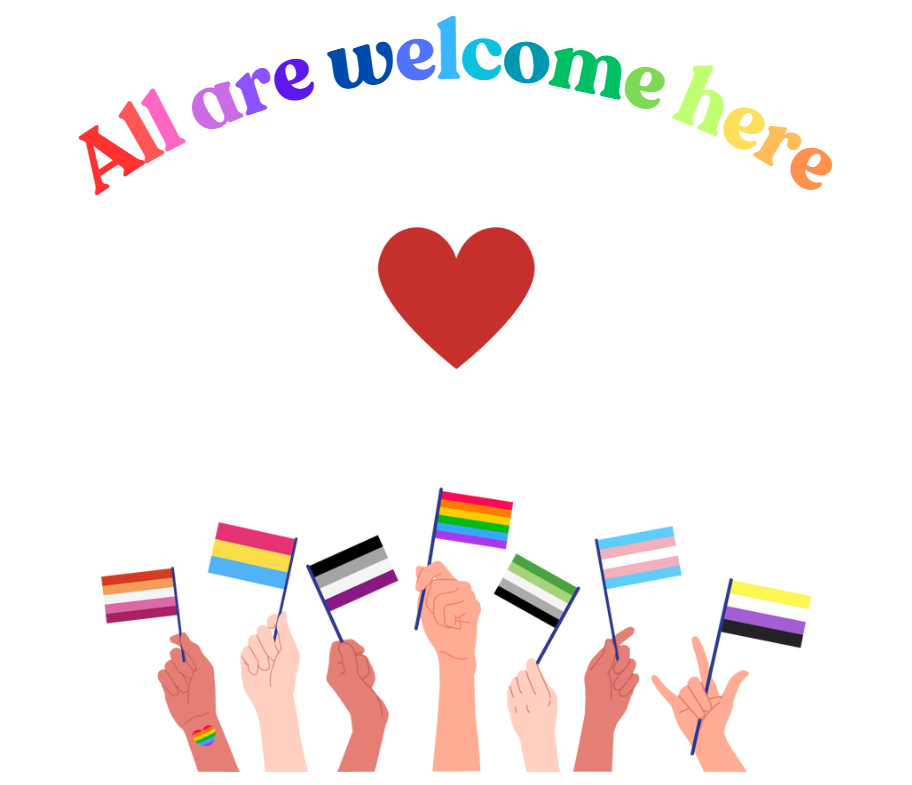Reverend Marci Scott-Weis, MDIV
As an Open and Affirming Church, who professed way back in 1996 that we ‘recognize all people are uniquely loved and valued by God’ and that ‘as an inclusive Christian community, we affirm each person’s unique contributions’, Isaiah 56:1-8 is really important for us to know and understand. It is a passage that affirms God’s radical welcome and love for all!
Now, I’m sure many of you have heard of passages in the Bible that are cited by our conservative and evangelical siblings as the biblical basis for the rationale to deny acceptance for lesbians, gays, bisexual, and transgender folks. These are passages found in Leviticus and Romans and most biblical scholars will tell you that our conservative and evangelical siblings’ understanding of these passages leaves much to be desired. That those passages cited as the rationale to exclude or reject the LGBTQ+ community really aren’t what they are understood to be about.
What is fair to say is that our conservative and evangelical siblings have certain scripture passages that are often cited (albeit probably incorrectly) to rationalize limitations on God’s acceptance and love of the LGBTQ+ community. And that’s why it’s so important for us to know about passages like the one from Isaiah that we just heard because it is a sort of antidote to those sorts of passages.
So, let’s break that Isaiah text apart, again, for us to truly embrace radical welcome for all of God’s people, this piece of scripture matters greatly. First off, this passage comes from what’s known as Third Isaiah, the last third of the Book of Isaiah where Isaiah is writing to the exiles who have returned to Jerusalem. These returned exiles had known loss, destruction, and pain and after decades, were being allowed to return home to Jerusalem rebuild.
And as they were rebuilding their community, they were grappling with what kind of community they wanted to build, what kind of people they wanted to be, and who was a part of that community and the Prophet Isaiah is speaking to those challenges with this passage. And we know that one of the critical components of forming a community is who gets to be a part of that community. That is foundational, right? Who gets in?
And there must have been some disagreements about who gets in because we have this wisdom from the Prophet Isaiah addressing exactly that question. And Isaiah answers that question by saying, ‘this is what the Lord says!’ and then goes on to answer the question about who gets in and who doesn’t, speaking on behalf of the Lord.
Isaiah does this by talking about eunuchs. In contemporary usage a “eunuch” is a castrated man, but it had a broader definition in ancient times. Literally meaning “the keepers of the bed,” in ancient times, the eunuchs served and guarded the women in royal palaces and wealthy households. Their employers wanted to be certain that the eunuchs would not get sexually involved with the women they were supposed to protect, so many eunuchs were castrated men, homosexual men, and intersex folk. Many, but not all, were both castrated and homosexual. Or put a different way, in ancient times, eunuchs were sexual minorities, a modern-day term we use today to describe lesbians, gay men, bisexuals and transsexuals.
And apparently when the exiles returned from Babylon, there was an outstanding question about whether or not eunuchs, these ancient sexual minorities, were welcome in the congregation, welcome in the community that was being formed post-exile. So, Isaiah answers this question about whether or not eunuchs are welcome, by saying, ‘maintain justice and do what is right!’
Do what is right!
Isaiah then goes on, in four brief verses, to make it abundantly clear that what the Lord says is ‘right’, is that the eunuch is not only welcome, but beloved by the Lord. Isaiah says that to the eunuch that honors God’s covenant, God will give them a memorial and a name better than sons and daughters. God knows them. God honors them.
To the eunuch, Isiah says that God will give them an everlasting name that will endure forever! Isaiah then goes on to say that God will bring the eunuch to God’s holy mountain and give them joy in God’s house of prayer. God will accept their offerings.
And Isaiah puts the ultimate point of clarity at the end by saying, God’s house will be called a house of prayer for ALL nations. Isaiah speaks of no boundaries, no exclusions, no caveats. The eunuch is not only welcome but called beloved and known by God, known by God, honored by God!
This passage matter because it tell us that our sacred scripture preserved core teachings that relate to the welcoming and acceptance and love of sexual minorities. And these biblical passages, speak to God’s recognition of the belovedness of the sexual minority, the recognition that gender is not strictly male and female and the radical welcoming of the ‘other’ with wide open and loving arms.
It’s critical that we as an Open and Affirming Church know that we stand on solid biblical ground in our radical welcoming, in our love for our LGBTQ+ siblings, and in our belief that no 2matter who you are or where you are on life’s journey, all are welcome here! Our sacred scripture affirms the belovedness of all.
The prophet Isaiah spoke to a people 2,500 years ago of radical welcome, of inclusion and of love for all people. We are all called to continue that work of inclusion and radical welcome as a community of faith here, now, in these times, in this congregation, in our families, in our communities and in our world.
Do what is right the prophet Isaiah tells us. Do what is right!
May it be so…
Amen

